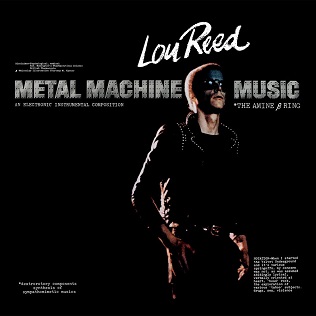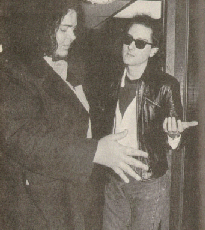Punk rock is a rock music genre that emerged in the mid-1970s in the United States, United Kingdom, and Australia. Rooted in 1960s garage rock and other forms of what is now known as "proto-punk" music, punk rock bands rejected perceived excesses of mainstream 1970s rock. They typically produced short, fast-paced songs with hard-edged melodies and singing styles, stripped-down instrumentation, and often political, anti-establishment lyrics. Punk embraces a DIY ethic; many bands self-produce recordings and distribute them through independent record labels and other informal channels.

Television is an American rock band from New York City, most notably active in the 1970s. The group was founded by Tom Verlaine, Richard Lloyd, Billy Ficca, and Richard Hell. An early fixture of CBGB and the 1970s New York rock scene, the band is considered influential in the development of punk and alternative music.

Metal Machine Music is the fifth studio album by American rock musician Lou Reed, released as a double album in July 1975 by RCA Records. A departure from the rest of his catalog, the album is variously considered to be a joke, a grudging fulfillment of a contractual obligation, or an early example of noise music. It features no songs or even recognizably structured compositions, eschewing melody and rhythm for modulated feedback and guitar effects, mixed at varying speeds by Reed. In the album's liner notes, Reed claimed to have invented heavy metal, and asserted that Metal Machine Music was the ultimate conclusion of the genre.
Garage rock is a raw and energetic style of rock and roll that flourished in the mid-1960s, most notably in the United States and Canada, and has experienced various revivals since then. The style is characterized by basic chord structures played on electric guitars and other instruments, sometimes distorted through a fuzzbox, as well as often unsophisticated and occasionally aggressive lyrics and delivery. Its name derives from the perception that groups were often made up of young amateurs who rehearsed in the family garage, although many were professional.

Robert Wolfe Quine was an American guitarist, known for his innovative guitar solos.
Rocket from the Tombs is an American rock band originally active from mid-1974 to mid-1975 in Cleveland, Ohio, United States. The band was reconstituted several times with various line-ups starting in 2003.

Ikue Mori, also known as Ikue Ile, is a drummer, electronic musician, composer, and graphic designer.

Kick Out the Jams is the debut album by American protopunk band MC5. It was released in February 1969, through Elektra Records. It was recorded live at Detroit's Grande Ballroom over two nights, Devil's Night and Halloween, 1968.
Proto-punk is the rock music played by garage bands from the 1960s to mid-1970s that presaged the punk rock movement. The phrase is a retrospective label; the musicians involved were generally not originally associated with each other, and came from a variety of backgrounds and styles, but together they anticipated many of punk's musical and thematic attributes.

Creem, "America's Only Rock 'n' Roll Magazine", was a monthly rock 'n' roll publication first published in March 1969 by Barry Kramer and founding editor Tony Reay. It suspended production in 1989 but attained a short-lived renaissance in the early 1990s as a glossy tabloid. Lester Bangs, often cited as "America's Greatest Rock Critic", became editor in 1971. The term "punk rock" was coined in May 1971, in Dave Marsh's Looney Tunes CREEM column about Question Mark & the Mysterians.
"Belsen Was a Gas" is a song by the British punk rock band the Sex Pistols. The song is about one of the Nazi concentration camps in Nazi Germany, Bergen-Belsen, which was liberated by British troops in 1945.

Peter Laughner was an American guitarist, songwriter and singer.

Metallic K.O. is a live recording by American hard rock band The Stooges. In its original form, the album was purported to contain the last half of a performance at the Michigan Palace in Detroit, on February 9, 1974—the band's final live performance until their reformation in 2003. The performance was notable for the level of audience hostility, with the band being constantly pelted with pieces of ice, eggs, beer bottles and jelly beans, among other things, in response to Iggy Pop's audience-baiting.

Count Five was an American garage rock band, formed in San Jose, California in 1964, best known for their hit single "Psychotic Reaction".

"Psychotic Reaction" is a song by the American garage rock band Count Five, released in June 1966 on their debut studio album of the same name. It peaked at No. 5 on the Billboard Hot 100, and was among the first successful acid rock songs, containing the characteristics that would come to define acid rock: the use of feedback and distortion replacing early rock music's more melodic electric guitars. In Canada, the song reached No. 3 on October 31, 1966.
Bottling is when a concert audience throws various objects at the performers onstage. This generally happens at festivals when one act in the lineup is of a different genre or audience from the rest of the bands, especially festivals where the majority of bands are related to heavy metal and punk rock music styles.
Carburetor Dung is a Malaysian punk rock band formed in 1991 in Kuala Lumpur. Formed by bassist Fendi as a band called Stormfish but later changed its name to Carburetor Dung when guitarist Joe Kidd joined the fold. The name came from Lester Bangs' book Psychotic Reactions and Carburetor Dung.

Psychotic Reactions and Carburetor Dung: The Work of a Legendary Critic: Rock 'n' Roll as Literature and Literature as Rock 'n' Roll is a collection of essays written by famous rock music critic Lester Bangs. Named for a 1971 article of the same title, it was edited by Greil Marcus and released in 1987, five years after Bangs' death. In his introduction, Marcus explains that, "Perhaps what this book demands from a reader is a willingness to accept that the best writer in America could write almost nothing but record reviews."












